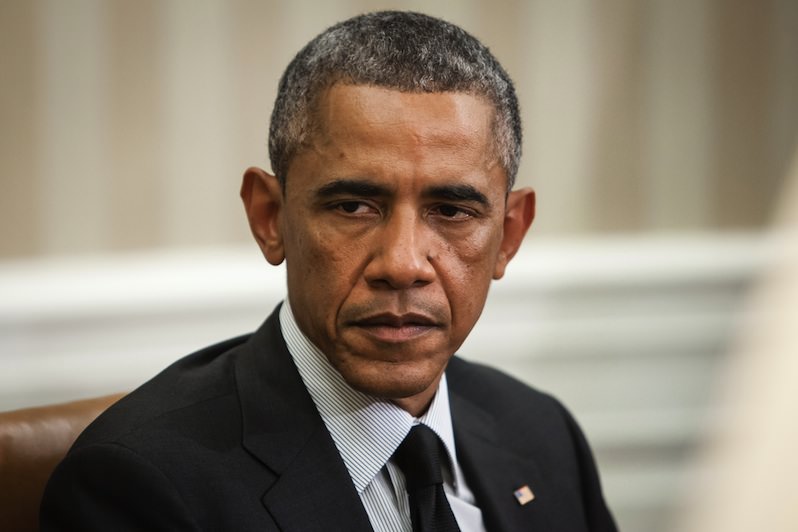Who Controls Iraq: President Obama or Islamic State?
Don't feel bad if you're confused about what the United States is trying to accomplish in Iraq. President Obama doesn't seem to know, either -- or else he won't say. President Barack Obama. (Drop of Light / Shutterstock)
President Barack Obama. (Drop of Light / Shutterstock)
WASHINGTON — Don’t feel bad if you’re confused about what the United States is trying to accomplish in Iraq. President Obama doesn’t seem to know, either — or else he won’t say.
Days after admitting that “we don’t yet have a complete strategy” for training Iraqi government forces — which are supposed to ultimately defeat Islamic State — Obama is sending an additional 450 troops to execute this unstrategized mission. That will raise the number of U.S. military personnel in Iraq to about 3,500. But what, realistically, is their goal? And how are they supposed to achieve it?
It is understandable that the president might feel pressed to do something in response to Islamic State’s recent battlefield gains — including the rout of disorganized Iraqi forces in Ramadi, the capital of Anbar Province. But Obama imposed such tight restrictions on the activities of American soldiers that only the sunniest optimist would believe this increase can make a military difference.
U.S. troops will not be allowed near the front lines, where their presence, according to Obama’s critics, could stiffen the resolve of an Iraqi army that often chooses to flee rather than fight. There will be no American forward air controllers, who could direct U.S. airstrikes with far greater precision. There will be no use of deadly Apache attack helicopters in support of Iraqi ground operations.
In essence, sending the 450 new troops is less a military move than a political gesture. After the fall of Ramadi, Iraqi Prime Minister Haider al-Abadi desperately needed a signal of U.S. support. In that strictly limited sense, I suppose, mission accomplished. Sort of.
With the added personnel, U.S. commanders will start by establishing a fifth site for training Iraqi forces. The new camp will be in Anbar, the heartland of Iraq’s Sunni minority, where American advisers will try to somehow inspire loyalty to the Shiite-dominated central government in Baghdad. Given the sectarian brutality of the Shiite militias that fight alongside the regular army, many Anbar tribal leaders have come to see the Islamic State as the lesser of two evils.
A few hundred extra U.S. soldiers, confined to their posts, are not going to turn the tide in this war. They represent just a baby step — but in a direction Obama obviously doesn’t want to go.
When the American airstrikes failed to halt Islamic State in its tracks, it didn’t take a clairvoyant to predict a future of gradual escalation and mission creep. Obama has stubbornly resisted, however. I believe he simply does not want his legacy to include embroiling the United States in another big, tragic, expensive, open-ended Middle East war.
I don’t blame him. Do you?
Critics of Obama’s policies propose relatively modest steps that sound reasonable: Speed up the training. Intensify the bombing, using American spotters. Provide more arms. Let U.S. advisers stand shoulder to shoulder with Iraqi officers on the front lines.
But none of this deals with the central problem, which is that too many Iraqis place sectarian, ethnic and regional loyalties ahead of their allegiance to the nation. If the ideal of a unified, pacified, pluralistic Iraq is more important to us than it is to the Iraqis, even the 10,000 additional U.S. troops proposed by Sen. Lindsey Graham, R-S.C., cannot possibly make a difference.
Yes, the United States could easily marshal the necessary forces and recapture Ramadi. But what would we do with it? Give it back to a government that the city’s residents don’t trust? Keep it under martial law until we could make it safe for McDonald’s?
Here’s a bigger question: Would a large, long-term U.S. military presence in Iraq — and, almost surely, Syria as well — make Americans safer? I think not, but it’s an argument worth having. What makes no sense to me is believing in an Iraqi nation that doesn’t believe in itself.
Obama’s hesitancy suggests a deep skepticism about what, at this point, must be considered his war. That would explain why he keeps announcing we have no strategy. Maybe one does exist — but the president doesn’t think it will work.
Or perhaps Obama is playing for time. Maybe he has decided to do just enough to keep the Iraqi government from collapsing, while giving his generals every chance to make their far-fetched training program work.
The problem is that in any war, the enemy gets a vote. And nothing, so far, has altered the fact that Islamic State is far more in control of events than the president.
Eugene Robinson’s email address is [email protected].
© 2015, Washington Post Writers Group
Your support matters…Independent journalism is under threat and overshadowed by heavily funded mainstream media.
You can help level the playing field. Become a member.
Your tax-deductible contribution keeps us digging beneath the headlines to give you thought-provoking, investigative reporting and analysis that unearths what's really happening- without compromise.
Give today to support our courageous, independent journalists.






You need to be a supporter to comment.
There are currently no responses to this article.
Be the first to respond.